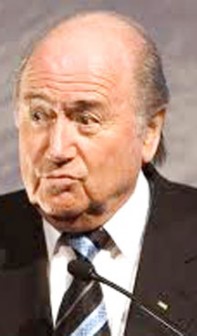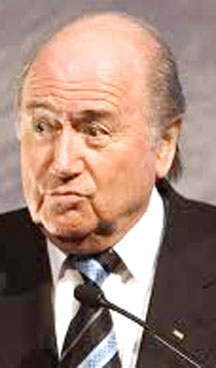PORT LOUIS, Mauritius, (Reuters) – A new set of statutes based on wide-ranging reforms aimed at cleaning up FIFA’s tarnished image were passed by huge majorities at its annual Congress yesterday – but with discontent as ever rumbling in the background.
FIFA president Sepp Blatter said he was “delighted with what we have achieved” after a marathon Congress lasting nearly eight hours as tough anti-racism measures were added to the rulebook.
Lydia Nsereka, 45, president of the Burundi Football Association, also became the first woman in its 109-year history to be voted on to the executive committee.
However, proposals to introduce age limits and mandate limits for senior officials was left off the agenda to the annoyance of UEFA, whose move to have them re-instated was deferred until next year’s Congress in Sao Paolo.

There was also an uncomfortbale moment in the Congress hall when Mark Pieth, the Swiss law professor who chairs the reforming Indepedent Governance Committee (IGC) told delegates from 208 of FIFA’s 209 members that Blatter and senior executives should reveal their salaries.
On the whole however, Blatter did steer the good ship FIFA “into the calm transparent waters of the harbour” after it was “tossing about in stormy seas” two years ago when the reform process started.
Blatter, 77, in his presidential address, said the reform process had changed the organisation, but that the reforms and the fights against racism and the scourge of match fixing goes on.
“We have been through a difficult time, it has been a test for the world of football and for those who live in it. As the captain I am pleased to say we have weathered the storm,” he said.
“We have emerged from the troubled waters stronger and now we can look forwards to the future and waters as calm as the beautiful sea around us in Mauritius,” Blatter added. “I think the boat can now go slowly into the harbour.”
Blatter, who initiated the reform process after the crises that enveloped the organisation in the wake of the joint bids for the 2018 and 2022 World Cups, and the scandal that surrounded the presidential election in 2011, said no matter what critics said FIFA had reacted to those problems.
“Yes, we had to change. We had to answer tough questions and we had to fight resistance even within our own community for the better of the game. It hurt, but like a football team we persevered and it paid dividends.
“These sweeping and hard-hitting reforms will change our organisation for the better and place FIFA at the forefront of governance standards in the world of sport.
“It would be a lie to say it was easy. It was not easy. But now we have the chance to make history by passing these reforms.”
MASSIVE MAJORITIES
When the time came to vote, they were all passed with massive majorities of well over 90 per cent.
Many of them involved detailed restructuring of mundane rules which are only of interest to those affected by them, but they also including the rubber-stamping of the new Ethics Committee with real teeth aimed at finding any wrongdoing.
The plan for Congress to decide the venues for future World Cups, rather than the executive committee, was also approved while the new anti-racism laws included a maximum five-match ban for those found guilty with the possibility of grounds being closed and teams relegated or kicked out of competitions.
Pieth emphasised that more needed to be done for FIFA to become truly transparent.
“A worldwide sports governing body like FIFA has similarities to an inter-governmental organisation and transparency is a key requirement,” he said.
“A remaining issue is transparency in the remuneration of key officials. These did not come overnight with major institutions but here FIFA needs to catch up.
“I would like to invite the president and members of the executive committee to take this step. It would send a crucial message to their constituencies and to the public at large that they have nothing to hide.”

